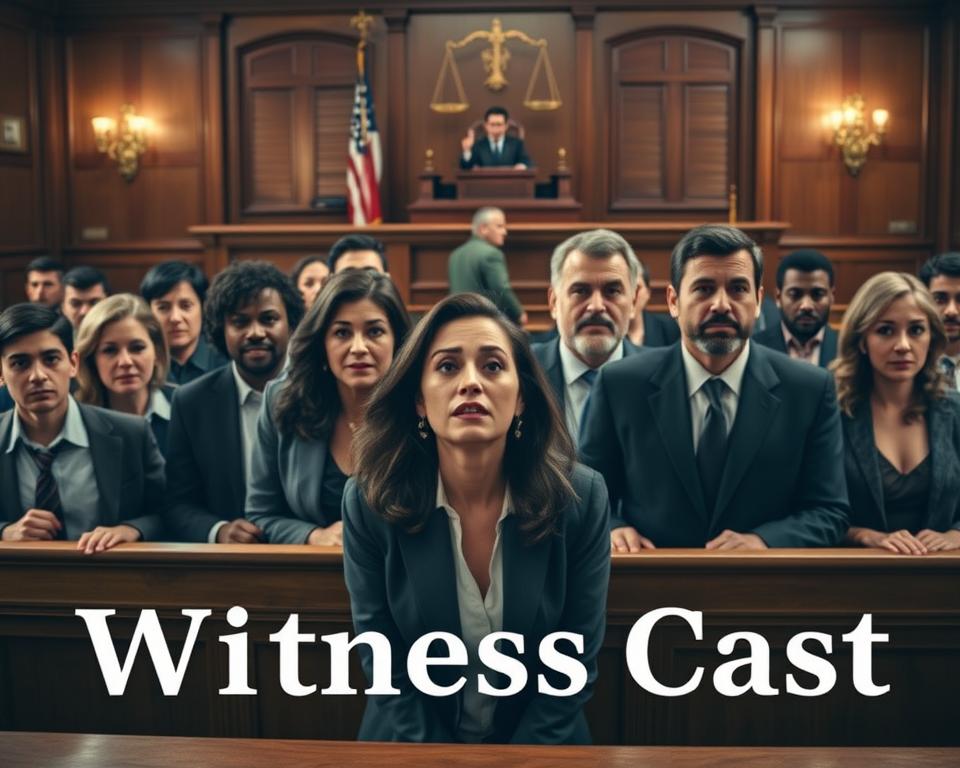The 1957 film “Witness for the Prosecution” was made on a small budget of $2 million. Yet, it made $9 million at the box office and got 6 Academy Award nominations, including Best Picture. This shows how much people love courtroom dramas and the key role of the witness cast.
Courtroom dramas are perfect for movies because they involve drama and suspense. The witnesses’ stories can change the trial’s outcome. These films show the legal battles and the risks faced by lawyers and judges.
The witness cast is essential in making courtroom dramas great. Their stories, whether emotional or complex, draw viewers in. They make the trial’s outcome feel real and important.
The Essence of Courtroom Dramas
At the heart of courtroom dramas are the high-stakes personal conflicts. These conflicts make the legal proceedings more than just details. They show how race, social class, and family history affect a jury’s decisions, adding emotional depth to the trial.
Stakes and Personal Jeopardy
The best courtroom dramas dive into the personal lives of key characters. They show how the trial’s outcome can change their futures. From a young lawyer fighting for a client to a defendant facing their past, these films capture the personal risk at the trial’s core.
Accurate Portrayal of the Law
Captivating courtroom dramas also show the legal system’s intricate workings. They accurately depict the legal procedures’ twists and turns. This makes the story engaging, drawing the audience into the drama unfolding on screen.
| Movie | Year | Key Highlights |
|---|---|---|
| Judgment At Nuremberg | 1961 | Prominent and experienced cast, including Spencer Tracy, Burt Lancaster, Marlene Dietrich, and Judy Garland, delivering powerful performances. |
| A Cry In The Dark | 1988 | Meryl Streep’s compelling portrayal of Lindy Chamberlain in a real-world case, showcasing the emotional depth attributed to Streep’s performance. |
| Anatomy Of A Murder | 1959 | Acclaimed for its depiction of the construction of a defense case, with James Stewart’s role particularly praised for keeping audiences engaged. |
These examples show what makes courtroom dramas so captivating. They blend legal realism with personal conflicts and emotional stakes, creating thought-provoking films.
This may also interest you:
Discover Gripping Showtime Series to Binge-Watch
Stephanie Courtney Net Worth: How Flo from Progressive 2024
Your Honor Show: Gripping Legal Drama on Showtime
Classic Courtroom Dramas
Courtroom dramas have long fascinated audiences. They give us a peek into the legal system and the stories that happen there. From “12 Angry Men” in 1957 to “Witness for the Prosecution” in the same year, these films show us bias, cynicism, and high-stakes courtroom battles.
“12 Angry Men” shows how personal biases can sway a jury. “Anatomy of a Murder” explores the tough choices defense attorneys face. “A Few Good Men” (1992) is famous for its intense scene between Tom Cruise and Jack Nicholson, showing the power struggles in a military trial.
“The Trial of the Chicago 7” (2020) by Aaron Sorkin dives deep into a famous political trial. It mixes justice, politics, and social unrest. “Witness for the Prosecution” is a gripping Agatha Christie adaptation that keeps viewers on the edge of their seats.
These classic dramas have made a lasting impact on the genre. They’ve inspired filmmakers and audiences to delve into the legal system and the human stories it holds.
| Film Title | Release Year | Director | Notable Actors | Key Themes |
|---|---|---|---|---|
| “12 Angry Men” | 1957 | Sidney Lumet | Henry Fonda, Lee J. Cobb | Individual biases, jury deliberations |
| “Anatomy of a Murder” | 1959 | Otto Preminger | James Stewart, Lee Remick | Cynicism in the legal process, defense strategies |
| “A Few Good Men” | 1992 | Rob Reiner | Tom Cruise, Jack Nicholson | Military court trials, power dynamics |
| “The Trial of the Chicago 7” | 2020 | Aaron Sorkin | Sacha Baron Cohen, Eddie Redmayne | Political trials, social unrest |
| “Witness for the Prosecution” | 1957 | Billy Wilder | Marlene Dietrich, Charles Laughton | Gripping legal narratives, Agatha Christie adaptation |
Real-Life Heroes on the Big Screen
Many courtroom dramas are based on true stories. They show heroes who fought for justice, even when it was hard. Movies like “Erin Brockovich,” “Judgment at Nuremberg,” and “Just Mercy” tell tales of bravery. They highlight how people risked a lot to help others and fight against wrongs.
These stories are both inspiring and thought-provoking. They show how ordinary people can become heroes. They use the law to fight for what’s right and protect the weak. These films entertain and teach us about the law and its importance in creating a fair society.
From “Erin Brockovich’s” battle against a big company to “Just Mercy’s” look at racial bias in the death penalty, these films are powerful. They remind us that fighting for justice can mean great personal sacrifice. By sharing these stories, filmmakers spark important talks and inspire others to fight for justice.
The success of these dramas comes from their ability to engage and educate. They highlight heroes who have dedicated their lives to justice and equality. Their stories remind us that fighting for justice is a never-ending battle. It takes courage and determination from those who dare to make a difference.
Gripping Legal Thrillers
Legal thrillers take courtroom dramas to a new level of suspense. Movies like “The Lincoln Lawyer,” “Michael Clayton,” and “Primal Fear” explore the tough choices lawyers face. They must decide between following the law and protecting their clients or themselves.
These decisions make the story tense and hard to look away from. In “The Lincoln Lawyer,” Mickey Haller defends a rich man accused of murder. He must untangle a complex web of lies and corruption.
In “Michael Clayton,” George Clooney plays a lawyer who uncovers a secret that could destroy his firm. This adds to the suspense and intrigue.
“Primal Fear” focuses on a young man accused of killing an archbishop. Edward Norton’s performance makes you question what is right and wrong in the legal world.
These movies are not just exciting; they also make you think about big moral questions. The characters’ high-stakes decisions keep you feeling tense and curious. It’s a thrilling ride that keeps you guessing until the end.
Witness Cast: Courtroom Comedies
Legal dramas and thrillers have always been popular. But the courtroom also offers a lot of comedic material. Movies like “Miracle on 34th Street,” “My Cousin Vinny,” and “Legally Blonde” show how funny legal stories can be. They make smart points about law in a light-hearted way.
In “Miracle on 34th Street,” a 1947 Christmas classic, Kris Kringle is on trial for being Santa. The movie is funny and shows how the law can prove Santa’s real. It brings Christmas magic to life.
“My Cousin Vinny,” from 1992, tells the story of two New Yorkers in an Alabama trial. Vinny, a bold lawyer played by Joe Pesci, helps them. They use their cleverness and unique strategies to win their case.
“Legally Blonde,” from 2001, is about Elle Woods, a fashion-forward girl who goes to Harvard Law. She wants to prove herself to her ex. Elle faces law school and a murder trial, showing her strength and breaking stereotypes.
These movies are a bit crazy, but they all have a funny take on law. The witness cast is key in these laughs. They show that courtrooms can be fun places where laughter and justice meet.
Conclusion
Courtroom dramas, thrillers, and comedies have always drawn us in. They show the drama and intrigue of the legal system. These films highlight the importance of the witness cast in shaping the story and outcome.
From “Witness” with Harrison Ford and Kelly McGillis, to classic thrillers, these movies captivate and teach us. The witness cast, as heroes, morally complex characters, or comedians, are key. Their actions and words guide the justice process.
The lasting charm of these films comes from their deep dive into the legal system and human nature. They make us think about our choices, the outcomes, and how justice meets personal lives. We’re left to consider the law’s complexities, the truth’s fragility, and human strength.

